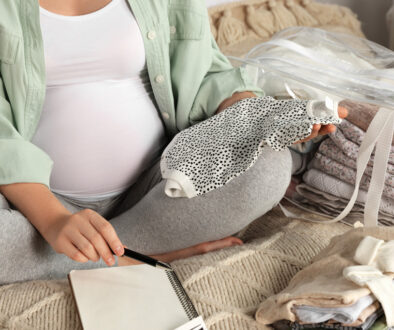What to Expect: We Follow Your Pregnancy Month to Month
It’s an exciting time.
If this is your first pregnancy, we know you may have questions about your developing baby. We welcome your questions, and we pledge that we will always take time to address any of your cares and concerns.
We’ll take you on a brief guide of your pregnancy month to month to give you an idea of what to expect and how we can help you along this journey.
A Guide to Pregnancy Month by Month
First Month – First Trimester Starts
During this first month, you may have just discovered you are pregnant. Even morning sickness can begin at this stage. Hormonal changes may cause fatigue, and you may have to go to the bathroom more than usual. You may also experience breast tenderness and sensitivity to certain foods or smells.
Even though your baby is smaller than a grain of rice, a tiny heart-like tube will beat roughly 65 times a minute. At this point, your baby will also begin to show signs of developing a mouth, lower jaw and throat. The eyes also start to develop.
We want you to schedule an appointment with us as soon as you discover that you’re pregnant. We’ll confirm the pregnancy and outline a plan of care that will ensure that you and your baby have the healthiest start possible.
Second Pregnancy Month
For some women, morning sickness and fatigue become more pronounced during the second month. Even though your baby is less than an inch long, you should continue to refrain from smoking, alcohol and limit caffeine. We’ll discuss other important adjustments you may need to make to help ensure the baby’s health.
We’ll continue to monitor your blood pressure and weight gain. In certain cases, we may suggest genetic testing.
During the second month, your baby’s arms and legs are starting to form and the neural tube –which contains tissue of the central nervous system– is formed.
If you’re wondering if you can keep –or start—an exercise routine during pregnancy, we’ll gladly outline a fitness plan and tell you what exercises are safe for baby.
Third Month
Good news–you may find that your nausea is subsiding. This is because your body is adjusting to the new hormone levels caused by pregnancy. At this point, your uterus is almost the size of a grapefruit.
At the end of this first trimester, your baby has developed fully formed hands, fingers, feet and toes. Teeth and fingernails are already starting to develop. While your baby already has reproductive organs, these are difficult to discover on an ultrasound at this point in your pregnancy. While the baby is moving, you’ll likely not feel this motion yet.
During your office visit, you will be able to hear your baby’s heartbeat. We will discuss options for genetic testing at this stage of pregnancy, which can detect conditions such as Down’s syndrome.
Fourth Pregnancy Month – Start of Your 2nd Trimester
Now you’re most likely starting to “show.” Most women find that their morning sickness fades when the second trimester starts. Even better, you’ll most likely feel more energetic as your hormones stabilize. You may also feel “flutters” as the baby begins to move.
While the baby’s lungs are still developing, the face and heart are fully formed. Baby is around five to six inches long.
Fifth Month
This month, you’ll have gained between 5 to 15 pounds. We’ll monitor your weight gain throughout your pregnancy to ensure it’s within normal ranges.
You may also notice:
- Your appetite has increased
- You’re more fatigued
- You experience bloating
- You are constipated
- Forgetfulness is more common
If any of these bother you, please speak with us! Remember that we are partners in your care throughout the entire pregnancy. We will always have time to answer your questions.
Baby is now six to nine inches long, and we may be able to determine the sex of your child by performing an ultrasound.
Sixth Month
As your uterus grows—it’s about the size of a basketball now—your skin may be itchy.
At this point, the baby responds by jerking or moving when the baby hears sounds. The baby may also develop hiccups. Baby is around 10 inches long and the eyes are able to open and close.
It’s considered normal to gain about a pound each week, and you may notice that you tire easily.
At this point in your pregnancy, we want to keep a close eye on your blood pressure to ensure you don’t have pregnancy-related hypertension (high blood pressure). This is why it’s so important to let us know if you have headaches, nosebleeds or swollen ankles. Although these symptoms may be normal during pregnancy, they may also be a sign of blood pressure problems. We’ll also test you for gestational diabetes.
Seventh Month – 3rd Trimester Starts
Baby becomes more active as the fetus develops. The baby is now almost 12 inches long. Did you know that your baby can now hear and see?
We encourage you to work with us to develop a birth plan at this point. Some women experience Braxton Hicks contractions (sometimes called “false labor”). These are non-productive uterine contractions.
We’ll continue to monitor you, checking your blood pressure and weight.
At this point in your pregnancy, we want to see you more frequently month to month. If you are a low-risk pregnancy, we’ll see you every other week, gradually building up to seeing you every week.
You should also have a good idea of what you want for your birth plan, so be sure to ask us about things like:
- Pain management
- Breastfeeding
- Fetal monitoring
- Labor induction
- C-sections (especially if you want to have a vaginal birth after previously having a C-section)
- Who you want in the delivery room with you (There may be temporary restrictions on this due to COVID-19)
We will follow your birth plan as long as it is safely possible to do so. We will respect your wishes, but our first priority is the safety of mom and baby. We encourage you to be flexible— your baby often has other plans!
Eighth Month
You’re in the final stretch. Baby is already pushing on your rib cage and may cause discomfort. The baby also “drops” deeper into the pelvis, so you may feel more pressure.
At this point, the baby weighs around five pounds. Typically, babies move to a head down position during this month.
We’ll start seeing you every week at this point in your pregnancy.
Ninth Month
The moment is here. You’re probably excited and maybe a bit anxious. Don’t worry; that’s perfectly normal. You can rest easy knowing we’re all supporting you 100 percent.
Baby will settle into your pelvis. Some women experience “nesting.” During this period, they have a sudden urge to organize and arrange the home and nursery as the delivery date approaches.
Baby is now six to eight pounds. We’ll monitor your cervix for signs of dilation, and we’ll give you a test for group b strep. This bacterium is typically found in healthy adults and generally causes no harm. However, in newborns it can in rare occasions cause serious illnesses.
Associates in Women’s Health in Raleigh Will Guide You From Conception to Delivery
We want to work with you the moment you decide to get pregnant. Why? So, we can guide you through an important preconception checklist. We’ve also provided this unique guide for your partner or support person.
For decades, we have been women providing quality health care to women throughout Raleigh and the Triangle area. If you’re pregnant or considering getting pregnant, please contact us for an appointment.
We would consider it a privilege to care for you.





